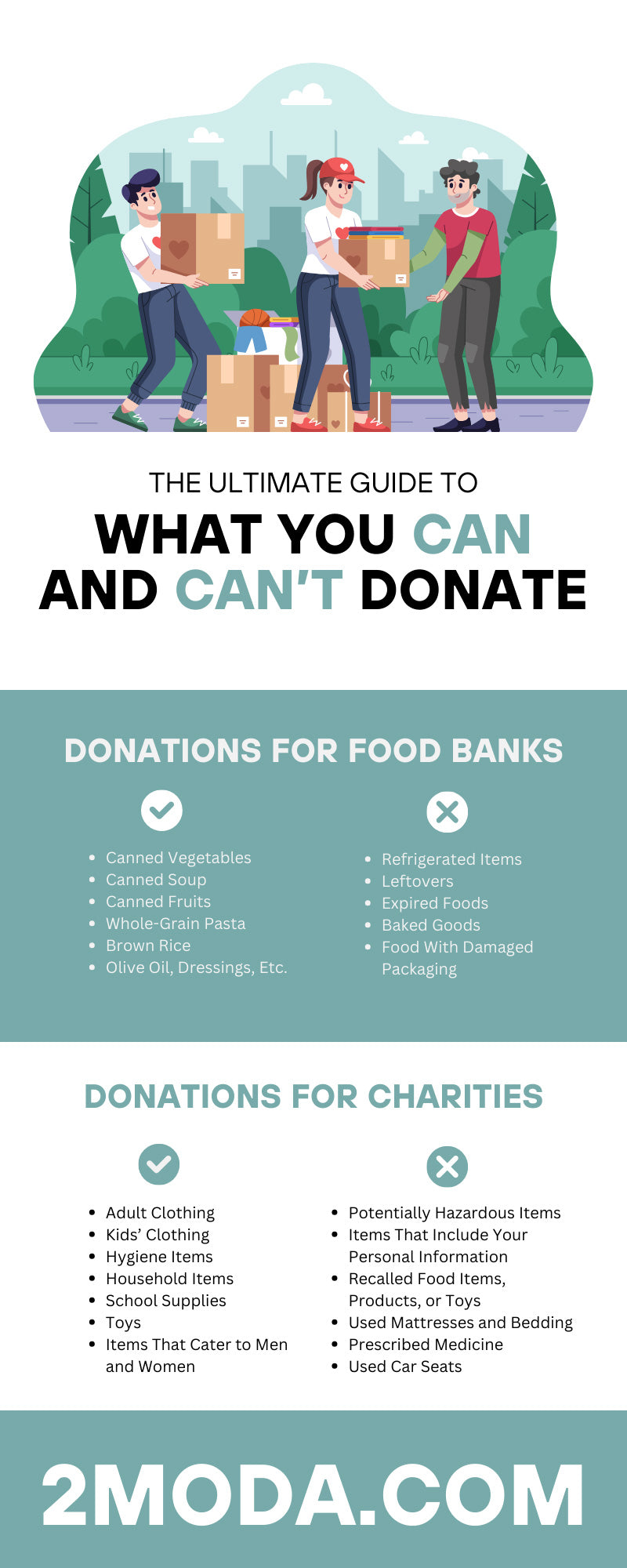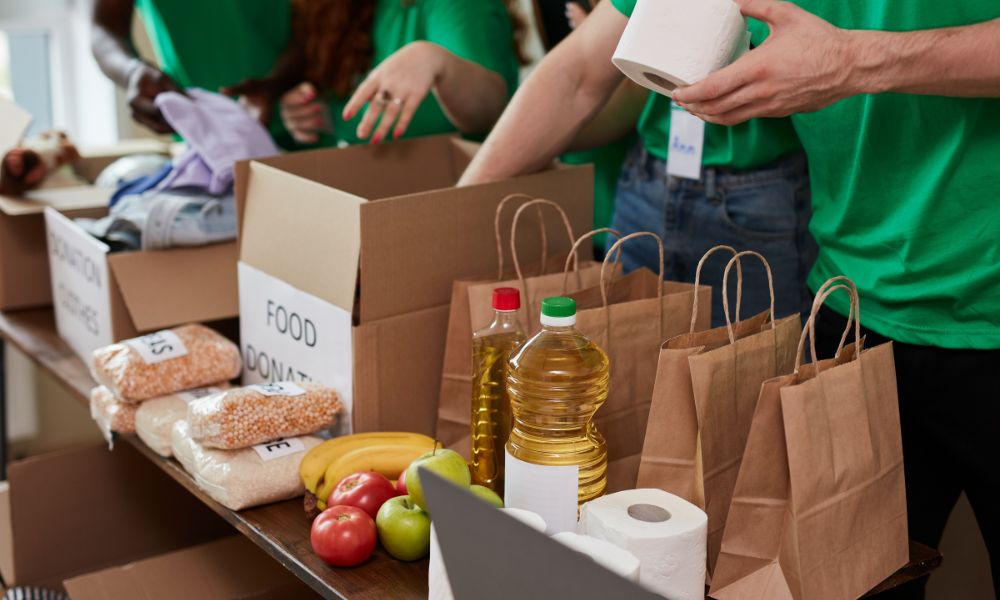Wanting to donate to a local charity or food bank is a wonderful way to give back to your community. However, navigating the donation process often leaves many people scratching their heads, wondering what items will help those in need.
With the goal of shedding some light on this topic, we’ve crafted the ultimate guide to what you can and can’t donate to local charities and food banks. This resource aims to empower you to make informed decisions that can make a real difference in your community.
Items That Food Banks Will Accept
Food banks play a crucial role in helping those who face food insecurity. However, there are certain items that food banks need more than others.
Canned Vegetables
Canned vegetables are a staple for food banks due to their long shelf life and nutritional value. Donating a variety of canned vegetables can help recipients enjoy a balanced diet.
Canned Soup
Canned soups, especially those low in sodium and high in nutrients, offer a comforting and quick meal option for individuals and families in need.
Canned Fruits
Canned fruits (preferably in their own juice rather than syrup) provide essential vitamins and make for easy storage and distribution.
Whole-Grain Pasta
Whole-grain pasta is a nutritious option that provides a base for many meals. Its high fiber content is beneficial for a healthy diet.
Brown Rice
Brown rice is another excellent source of nutrients. It’s a versatile staple that pairs well with a variety of foods.
Olive Oil, Dressings, Etc.
Donating olive oil and various dressings can add flavor and depth to meals, making simple ingredients come together to make something special.
Items That Food Banks Won’t Accept
While they always appreciate the intention to donate, certain items aren’t suitable for food banks due to safety, health, or logistical reasons. These items include the following.
Refrigerated Items
Due to an inability to store perishable items safely, many food banks can’t accept refrigerated items.
Leftovers
Food safety regulations prevent food banks from accepting any leftovers, as they pose a risk of contamination and spoilage.
Expired Foods
Expired foods, regardless of their type, could harm consumers and are against health regulations.
Baked Goods
Due to their short shelf life and potential for allergens, food banks generally don’t accept baked goods. Food banks also won’t accept prepared foods like muffins or cupcakes because they can’t determine how you made them.
Food With Damaged Packaging
Damaged packaging can compromise the safety and integrity of food products, making them unsuitable for donation.
Top Items That Charities Need
Charities need safe, sanitary, and in-good-condition items. However, they won’t accept every new or barely used item you donate. Here’s a list of the top items that charities need.
Adult Clothing
Charities always want gently used adult clothing. Items like coats, shoes, business attire, and everyday wear can help adults in need, especially those looking for employment or those who have fallen into tough times.
Kids’ Clothing
Just like adult clothing, there’s a constant demand for kids’ clothing. Children grow quickly and often need new sizes every season. Donating your gently used children’s clothes can greatly assist families struggling to keep up with their kids’ growth spurts.
Hygiene Items
Personal hygiene is fundamental, yet many people lack access to basic hygiene products. Charities highly value donations of new, unopened hygiene items. To make a direct and meaningful impact, consider assembling bulk hygiene kits for the homeless.
Household Items
Small appliances, kitchenware, and other gently used household items can help many families start over. Charities are always looking for items that help people with daily life.
School Supplies
Education is a pathway out of poverty, but many students lack the basic supplies needed to succeed. Donating new pencils, notebooks, backpacks, and other school essentials can empower young learners to achieve their academic goals.
Toys
New or gently used toys can bring joy and comfort to children in difficult situations. Toys also help children develop mental and social skills and provide a sense of normalcy in the lives of those who have experienced trauma.
Items That Cater to Men and Women
Charities always need specific items tailored to men’s and women’s needs, such as business suits for job interviews or maternity clothes. These donations help individuals prepare for important life events and transitions.
Top Items You Shouldn’t Donate to Charities
While charities accept many items, there are some items that they can’t accept. They must adhere to local regulations and may not have the space for multiple items. They also must take care of their recipients’ health and well-being. Here’s a list of items that you should never donate to your local charity.
Potentially Hazardous Items
Charities can’t accept items that pose a safety risk, such as weapons, flammable materials, or chemicals. These items require special disposal methods and shouldn’t end up in donation bins.
Items That Include Your Personal Information
Before donating electronics or any items that could store personal information, you should erase and remove this data. Protecting your privacy also protects the charity and its beneficiaries.
Recalled Food Items, Products, or Toys
Check that government agencies haven’t recalled the items you plan to donate. Donating recalled items can create health risks and legal problems for charitable organizations.
Used Mattresses and Bedding
Due to health and hygiene concerns, charities generally don’t accept used mattresses and bedding. These items can harbor bedbugs and other pests, posing a significant risk to those in need.
Prescribed Medicine
Donating prescribed medicine is illegal and dangerous. People can only use medications that they receive from a medical professional.
Used Car Seats
Safety standards for car seats change frequently, and used car seats may not meet current safety requirements. Additionally, it’s often impossible to know if a used car seat has been in an accident and is unsafe.
Reading our ultimate guide to what you can and can’t donate will clear up any confusion and encourage more meaningful contributions. As we strive to help our communities, let’s do all we can to provide local charities and food banks with the support they need.
Visit the 2Moda website today to purchase a range of wholesale products for charitable organizations. Together, armed with the right information, we can make contributions that truly make a difference.


